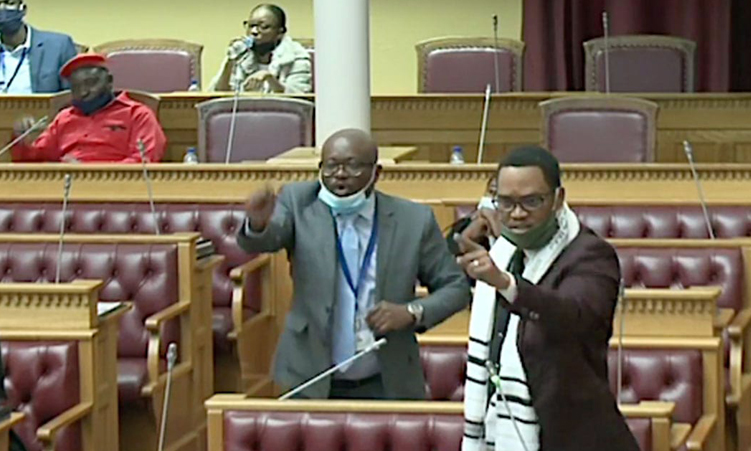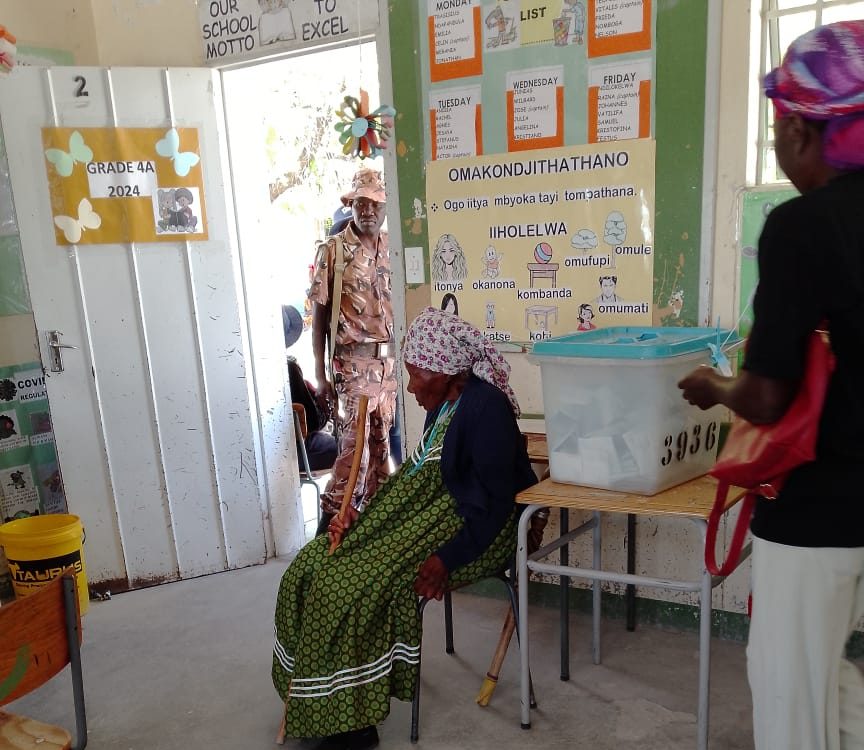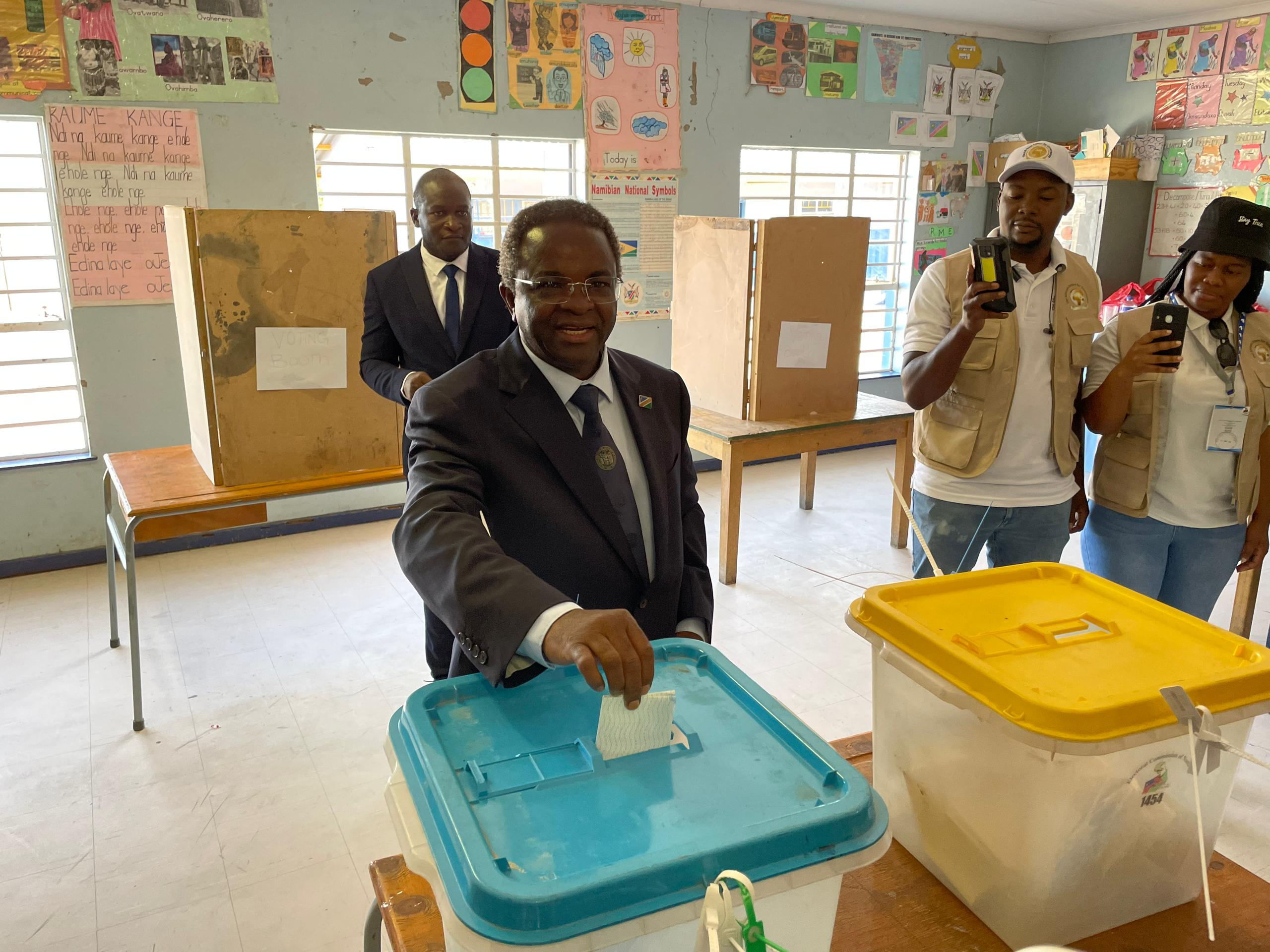The behaviour of Landless People’s Movement leader Bernadus Swartbooi and his former party colleague Henny Seibeb before they were ejected from the National Assembly in April 2021 was described as ugly, depraved and deplorable in a judgement delivered in the Windhoek High Court on Friday.
The description of the two Landless People’s Movement (LPM) parliamentarians’ conduct came in a judgement in which Swartbooi, Seibeb and the LPM successfully challenged disciplinary steps taken against Swartbooi and Seibeb after they were accused of disorderly conduct during president Hage Geingob’s state of the nation address in parliament on 15 April 2021.
In the decision by judges Thomas Masuku, Boas Usiku and Eileen Rakow, the court reviewed and set aside parliamentary committees’ decisions to investigate and discipline Swartbooi and Seibeb and a decision of the National Assembly to adopt a report on an investigation into their conduct.
Those decisions were taken after National Assembly speaker Peter Katjavivi ordered Swartbooi and Seibeb to leave the National Assembly chamber because they disrupted proceedings while Geingob was answering questions posed to him by members of parliament. Swartbooi was escorted out of the chamber, while Seibeb was bundled out by police officers and bodyguards of the president.
The court observed in its judgement that 15 April 2021 “will go down in the annals of Namibia’s legislature’s history as a sad and lamentable day”.
It added that there were unprecedented and ugly scenes in parliament that day, with Swartbooi and Seibeb behaving “in a depraved manner, ill-befitting the stature of the National Assembly” and with their conduct also described as “deplorable”.
While it was accepted that Swartbooi and Seibeb were liable to be censured, the steps taken against them after Katjavivi ordered them out of the assembly chamber were not lawful, though and had to be set aside, the court found.
LPM spokesperson Lifalaza Simataa yesterday said winning the case shows the importance of ensuring there are checks and balances on power vested in authority figures and why such power should not be abused.
“This victory is not merely one for LPM but an important one for Namibia. It creates deterrence for institutions and leaders in authority positions, to not abuse the power entrusted to them but also that if Namibians face injustice from institutions attempting to abuse their position, that there are platforms where these battles can occur and justice prevail,” Simataa said.
Seibeb, who resigned from the LPM and as a member of parliament two weeks ago, said justice has been served and the court’s decision was gratifying.
“Finally, justice has been served and history has vindicated me,” he said. “This case stands as one of the most exemplary judicial review cases and will be remembered in Namibian history as such,” Seibeb remarked.
The court set aside a decision of the National Assembly’s rules committee to refer the two parliamentarians’ matter to the assembly’s privileges committee and also set aside the privileges committee’s decision to investigate the conduct of Swartbooi and Seibeb, as well as meetings and decisions of the committee after that decision.
The High Court also set aside a decision of the National Assembly to adopt a report of the privileges committee on the behaviour of Swartbooi and Seibeb during Geingob’s address to a joint session of parliament.
In the report, adopted by the assembly in October 2021, the privileges committee recommended that the National Assembly should find that Swartbooi and Seibeb breached the parliamentary code of conduct through behaviour that did not maintain the National Assembly’s dignity and image.
As a penalty, the committee recommended that Swartbooi and Seibeb should be reprimanded.
In its judgement on Friday, the court further declared the term “grossly improper” in the parliamentary rule giving the speaker the power to order a member to withdraw from the National Assembly chamber for bad behaviour as vague and unconstitutional.
The declaration of the rule as unconstitutional is suspended for 24 months, to give the National Assembly an opportunity to correct the defect found in the rule, the court stated.
Swartbooi and Seibeb were suspended as members of parliament six days after Katjavivi ordered them to leave the assembly’s chamber.
They fought a legal battle against their suspension and scored a first victory in the Supreme Court in August 2021, when that court declared their suspension was unlawful and a nullity.
The Supreme Court found that the speaker did not have the power to suspend Swartbooi and Seibeb and that such a decision should have been made by the National Assembly instead.
In its judgement on Friday, the High Court found that the parliamentary rules do not give the rules committee the power to refer the matter about the conduct of Swartbooi and Seibeb to the privileges committee to be investigated.
The court noted that the parliamentary rules state that the speaker may report alleged “grossly improper” conduct of a National Assembly member to the rules committee, which may then recommend that the member concerned be suspended for seven days for a first transgression or longer periods for subsequent transgressions.
The rules committee’s decision to refer the matter to the privileges committee for investigation was not in accordance with the parliamentary rules and as a result all decisions taken by the privileges committee afterwards were null and void, the court found.
The court stated as well that Katjavivi, who was part of the committees that took decisions on the matter and chaired the National Assembly’s session during which the privileges committee’s report was adopted, should not have participated in the process after he ordered Swartbooi and Seibeb to withdraw from the parliamentary chamber.
On the use of the term “grossly improper conduct” in the parliamentary rules, which was found to be vague and thus unconstitutional, the court said parliament should identify the types of conduct that would be included under that description, to create clarity for the speaker and also for members of parliament.
Swartbooi, Seibeb and the LPM were represented by Patrick Kauta and South African legal counsel Kameel Premhid when oral arguments were heard by the court near the end of August last year.
Senior counsel Vincent Maleka, assisted by Sisa Namandje, represented the speaker and the National Assembly.
Stay informed with The Namibian – your source for credible journalism. Get in-depth reporting and opinions for
only N$85 a month. Invest in journalism, invest in democracy –
Subscribe Now!






